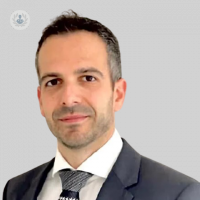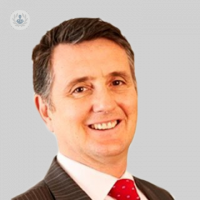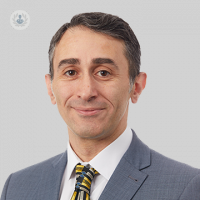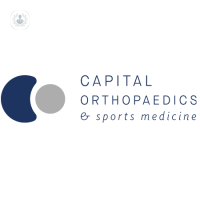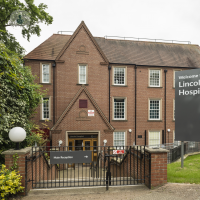What can cause elbow pain?
Elbow pain can have a number of causes. The elbow is a complex joint formed by bones, cartilage, ligaments and fluids. The muscles and tendons help to move the joint and if any of these parts suffers any damage, the pains and problems appear.

Elbow pain can occur as a result of:
- Muscle strain or sprain – the muscles or ligaments in your elbow can be strained from overexertion. However, with rest and proper support, they should heal over time and your symptoms should improve.
- Bone fracture – this usually occurs as a result of playing sport or a fall, and is a sudden injury. You may still be able to move the elbow but it will be painful to do so. It’s important to seek medical help if you suspect you’ve had a fracture, as leaving the elbow untreated can lead to the bones not healing properly
- Dislocation – this occurs when one of the bones in the elbow moves out of place, causing significant pain. You should get medical help for a dislocated elbow immediately.
- Tendinitis – certain movement, such as arm movements involved in playing golf (golfer's elbow or medial epicondylitis) or tennis (tennis elbow or lateral epicondylitis), can result in the tendons in your elbow becoming inflamed from overuse. These injuries are not limited to sports players – they can happen to anyone who frequently carries out a similar arm movement, such as at work.
- Bursitis – another injury from repetitive arm movement, where sacs containing fluid become swollen and cause pain in the elbow.
- Arthritis – both osteoarthritis (wear and tear of the cartilage in your elbow) and rheumatoid arthritis (a condition causing inflammation in your joints) can result in joint pain in the elbow. In this situation a rheumatologist will recommend the best treatment.
- Trapped nerve – everyone has a number of nerves travelling down the arm, through the elbow and the hand. Sometimes a nerve can get trapped in the elbow, causing constant pain and some tingling. This can also cause similar symptoms in the hand and fingers.
Who should I see about elbow pain?
You should see your GP in the first instance, who is likely to refer you to a specialist rheumatologist for pain management, or possibly an orthopaedic surgeon if surgery is required. As part of your diagnosis, imaging tests (such as an X-ray or MRI) may be required.
The relevant specialist will coordinate your care, which may involve:
- medication
- physical therapies, including rest, ice, ultrasound and massage
- acupuncture laser therapy (this aims to stimulate the release of serotonin and endorphins, resulting in pain relief and improved mood, sometimes negating the need for taking NSAIDs)
- splints and other support for the elbow
If no improvement is seen in the patient's elbow pain, then the following treatments may be required:
- anti-inflammatory injections
- in severe cases, elbow surgery
Elbow Pain
Dr Ziad Farah - Rheumatology
Created on: 11-13-2012
Updated on: 06-05-2023
Edited by: Sophie Kennedy
What can cause elbow pain?
Elbow pain can have a number of causes. The elbow is a complex joint formed by bones, cartilage, ligaments and fluids. The muscles and tendons help to move the joint and if any of these parts suffers any damage, the pains and problems appear.

Elbow pain can occur as a result of:
- Muscle strain or sprain – the muscles or ligaments in your elbow can be strained from overexertion. However, with rest and proper support, they should heal over time and your symptoms should improve.
- Bone fracture – this usually occurs as a result of playing sport or a fall, and is a sudden injury. You may still be able to move the elbow but it will be painful to do so. It’s important to seek medical help if you suspect you’ve had a fracture, as leaving the elbow untreated can lead to the bones not healing properly
- Dislocation – this occurs when one of the bones in the elbow moves out of place, causing significant pain. You should get medical help for a dislocated elbow immediately.
- Tendinitis – certain movement, such as arm movements involved in playing golf (golfer's elbow or medial epicondylitis) or tennis (tennis elbow or lateral epicondylitis), can result in the tendons in your elbow becoming inflamed from overuse. These injuries are not limited to sports players – they can happen to anyone who frequently carries out a similar arm movement, such as at work.
- Bursitis – another injury from repetitive arm movement, where sacs containing fluid become swollen and cause pain in the elbow.
- Arthritis – both osteoarthritis (wear and tear of the cartilage in your elbow) and rheumatoid arthritis (a condition causing inflammation in your joints) can result in joint pain in the elbow. In this situation a rheumatologist will recommend the best treatment.
- Trapped nerve – everyone has a number of nerves travelling down the arm, through the elbow and the hand. Sometimes a nerve can get trapped in the elbow, causing constant pain and some tingling. This can also cause similar symptoms in the hand and fingers.
Who should I see about elbow pain?
You should see your GP in the first instance, who is likely to refer you to a specialist rheumatologist for pain management, or possibly an orthopaedic surgeon if surgery is required. As part of your diagnosis, imaging tests (such as an X-ray or MRI) may be required.
The relevant specialist will coordinate your care, which may involve:
- medication
- physical therapies, including rest, ice, ultrasound and massage
- acupuncture laser therapy (this aims to stimulate the release of serotonin and endorphins, resulting in pain relief and improved mood, sometimes negating the need for taking NSAIDs)
- splints and other support for the elbow
If no improvement is seen in the patient's elbow pain, then the following treatments may be required:
- anti-inflammatory injections
- in severe cases, elbow surgery
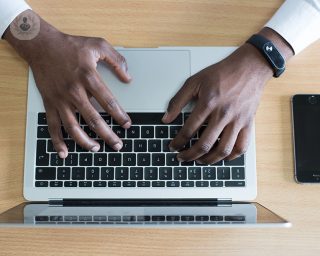

Computer elbow: can I get tennis elbow from typing too much?
By Mr Phil Wright
2024-12-26
Computer elbow, better known as tennis elbow, is a stress injury to your elbow from repetatively typing and gripping your computer mouse. It's a classic sign of being overworked and now with the increasing use of computers and laptops in the workspace, this condition is becoming more common. We asked Mr Phil Wright, an expert consultant orthopaedic surgeon who specialises in elbow pain, to explain a bit more about how it develops and what ergonomic changes you should make to prevent it. See more
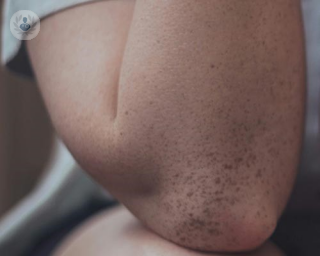

How do I know if my elbow pain is serious?
By Mr Alexander Magnussen
2024-12-26
Elbow pain can range from mild discomfort to severe pain that limits your ability to move or use your arm. Here to tell us all about is leading consultant upper limb and hand surgeon Mr Alexander Magnussen. See more


What is the best treatment for golfer’s elbow?
By Mr G Shyamalan (Shyam)
2024-12-23
After the winter break, injuries to unused and untrained muscles are likely to occur for many golfers. One of the most common of these injuries is golfer's elbow. To prepare for this, Mr Gunaratnam Shyamalan has put together this helpful guide explaining the various treatments available and the most effective ways to alleviate pain and symptoms. See more
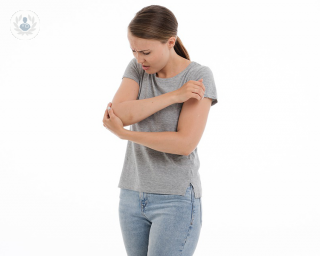

How do I know if I need elbow surgery?
By Mr Nick Ferran
2024-12-23
Most chronic elbow conditions can be helped with non-surgical management such as physiotherapy. However, some conditions continue to cause pain or stiffness despite physiotherapy and may require surgery. We asked orthopaedic surgeon Mr Nick Ferran about shoulder surgery and how to take care of your elbow afterwards. See more
Experts in Elbow Pain
-
Mr Steven Corbett
Orthopaedic surgeryExpert in:
- Elbow arthroscopy
- Elbow Pain
- Shoulder surgery
- Sports injuries
- Sports surgery
- Sports traumatology
-
Dr Dhiya Houssien
RheumatologyExpert in:
- Osteoarthritis
- Rheumatoid arthritis
- Neck pain
- Fibromyalgia
- Elbow Pain
- Back pain
-
Mr Nick Ferran
Orthopaedic surgeryExpert in:
- Shoulder arthroscopy
- Elbow Pain
- Frozen shoulder
- Rotator cuff surgery
- Cubital tunnel syndrome
- Shoulder surgery
-
Mr Omar Haddo
Orthopaedic surgeryExpert in:
- Shoulder surgery
- Rotator cuff injury
- Elbow Pain
- Wrist surgery
- Hand injury
- Frozen shoulder
-
Mr Phil Wright
Orthopaedic surgeryExpert in:
- Shoulder replacement
- Shoulder arthroscopy
- Rotator cuff injury
- Shoulder surgery
- Elbow Pain
- Platelet-rich plasma
- See all

Thornbury Hospital - part of Circle Health Group
Thornbury Hospital - part of Circle Health Group
312 Fulwood Road, Sheffield S10 3BR
No existe teléfono en el centro.
By using the telephone number provided by TOP DOCTORS, you automatically agree to let us use your phone number for statistical and commercial purposes. For further information, read our Privacy Policy
Top Doctors

Capital Orthopaedics & Sports Medicine
Capital Orthopaedics & Sports Medicine
164 Cromwell Rd
No existe teléfono en el centro.
By using the telephone number provided by TOP DOCTORS, you automatically agree to let us use your phone number for statistical and commercial purposes. For further information, read our Privacy Policy
Top Doctors

The Lincoln Hospital - part of Circle Health Group
The Lincoln Hospital - part of Circle Health Group
Nettleham Road, Lincoln, Lincolnshire, LN2 1QU
No existe teléfono en el centro.
By using the telephone number provided by TOP DOCTORS, you automatically agree to let us use your phone number for statistical and commercial purposes. For further information, read our Privacy Policy
Top Doctors
-
Thornbury Hospital - part of Circle Health Group
312 Fulwood Road, Sheffield S10 3BR, SheffieldExpert in:
- Cardiology
- Colorectal surgery
- Endocrinology, Nutrition and Thyroid
- endoscopy
- Fertility
- Otolaryngology
-
Capital Orthopaedics & Sports Medicine
164 Cromwell Rd, West LondonExpert in:
- Minimal access surgery (keyhole surgery)
- Orthopaedic surgery
- Robotic Surgery
- Shoulder and elbow
- Foot and ankle
- Knee
-
The Lincoln Hospital - part of Circle Health Group
Nettleham Road, Lincoln, Lincolnshire, LN2 1QU , LincolnExpert in:
- Abdominal ultrasound
- Abdominoplasty
- Radiofrequency ablation (RFA)
- Acne
- Vascular Surgery
- Thread veins
- See all
- Most viewed diseases, medical tests, and treatments
- Ulnar nerve entrapment
- Peripheral nerve block
- Peripheral neuropathy
- Migraine
- Paediatric rheumatology
- Autoimmune diseases
- Joint pain
- Lumbar herniated disc
- Abdominal pain
- Spinal surgery
